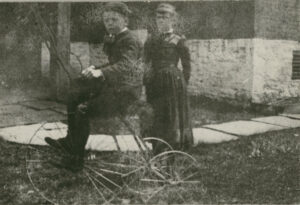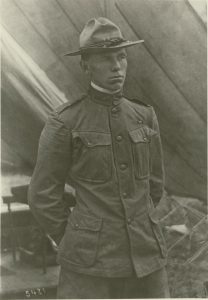Next week, students from all over the world will descend on Washington, D.C. to participate in the 91st Scripps National Spelling Bee. This year’s contest has 516 spellers who are competing for the $40,000 prize. Throughout the week the students will experience both great excitement as they move on to another round and great agony when they are eliminated. Although the National Spelling Bee did not exist when George C. Marshall was a young boy attending Miss Thompson’s school in Uniontown, Pennsylvania, a spelling bee served as an amusing and formative incident in the young boy’s life.
Many years later during an interview with his official biographer Dr. Forrest C. Pogue, Marshall recalled:
 “I think I told you about the spelling bee in which I made my first heavy effort in studying in order to get up to the head of the class which was held by Catherine Lindsey, who was the pretty girl I was devoted to, though she didn’t pay much attention to me. After what I thought was a terrific effort, I moved up to number two in the class and was only there a day when I got spelled down and I never studied after than for many years.”
“I think I told you about the spelling bee in which I made my first heavy effort in studying in order to get up to the head of the class which was held by Catherine Lindsey, who was the pretty girl I was devoted to, though she didn’t pay much attention to me. After what I thought was a terrific effort, I moved up to number two in the class and was only there a day when I got spelled down and I never studied after than for many years.”
Marshall suffered the dual defeat of losing his spot next to the girl he liked and refusing to take his studies seriously for many years thereafter. His mediocre academic record was one reason that his older brother Stuart did not want George to attend the Virginia Military Institute (VMI) for fear that George would flunk out and embarrass the family name. George remained a mediocre student at VMI, where his academic ranking was 15th out of 33 cadets by the end of his final year.
Later, as a student at the Infantry and Cavalry School at Fort Leavenworth, Marshall finally had a breakthrough regarding his dislike of studying. Since the academic rankings at the end of the school year significantly influenced a soldier’s prospects for promotion to higher rank, the competition among the students was intense. Marshall recalled:
“You might say 95 percent wasn’t sufficient at all. It had to be 99 or at least a fraction, if not perfect, because there were so many others who were going to be about the same. If you were going to be compete, you had to be near perfection in the particular subjects, and that’s what made it so hard.”

Although only a lieutenant, Marshall finished first in his class. Marshall credited his experience at Fort Leavenworth as, “invaluable to me as a matter of training because I learnt a thoroughness which stood me in good stead through all the clamor and push and excitement, lack of time, and also during the war…and I was able to turn out the things within the time I was limited to.”
Marshall acknowledged, “my Leavenworth training stood me in good stead as to the habits of work.” He continued, “My habits of thought were being trained. While you might say in one sense you could almost say little I learnt I could use, I learnt how to learn.”
Despite Marshall’s mediocre academic record early in life, the study and work habits he developed a Fort Leavenworth served him well throughout the rest of his army career and aided him in his selection as Chief of Staff of the U.S. Army.
